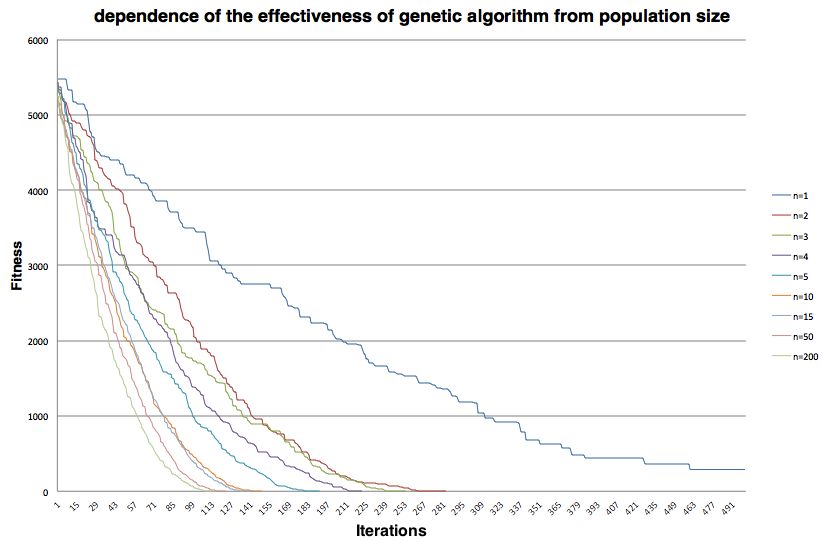lagodiuk / Genetic Algorithm
Licence: other
Generic implementation of genetic algorithm in Java.
Stars: ✭ 112
Programming Languages
java
68154 projects - #9 most used programming language
Labels
Projects that are alternatives of or similar to Genetic Algorithm
Metaheuristics
Implement the-state-of-the-art meta-heuristic algorithms using python (numpy)
Stars: ✭ 95 (-15.18%)
Mutual labels: genetic-algorithm
Vehicleroutingproblem
Solved using AI techniques: Savings, Sweep, Genetic Algorithm, Google OR Tools
Stars: ✭ 61 (-45.54%)
Mutual labels: genetic-algorithm
Path planning
This repository contains path planning algorithms in C++ for a grid based search.
Stars: ✭ 70 (-37.5%)
Mutual labels: genetic-algorithm
Cross Adaptive Audio
Evolving Artificial Neural Networks for Cross-Adaptive Audio Effects
Stars: ✭ 82 (-26.79%)
Mutual labels: genetic-algorithm
Genann
simple neural network library in ANSI C
Stars: ✭ 1,088 (+871.43%)
Mutual labels: genetic-algorithm
Oxigen
Fast, parallel, extensible and adaptable genetic algorithms framework written in Rust
Stars: ✭ 108 (-3.57%)
Mutual labels: genetic-algorithm
Mealpy
A collection of the state-of-the-art MEta-heuristics ALgorithms in PYthon (mealpy)
Stars: ✭ 72 (-35.71%)
Mutual labels: genetic-algorithm
Evoasm.rb
An AIMGP (Automatic Induction of Machine code by Genetic Programming) engine
Stars: ✭ 91 (-18.75%)
Mutual labels: genetic-algorithm
Mgo
Purely functional genetic algorithms for multi-objective optimisation
Stars: ✭ 63 (-43.75%)
Mutual labels: genetic-algorithm
Radiate
Radiate is a parallel genetic programming engine capable of evolving solutions to many problems as well as training learning algorithms.
Stars: ✭ 65 (-41.96%)
Mutual labels: genetic-algorithm
Genetic Algorithm Montage
genetic algorithm for self-referential image approximation.
Stars: ✭ 86 (-23.21%)
Mutual labels: genetic-algorithm
Cgp Cnn
A Genetic Programming Approach to Designing CNN Architectures, In GECCO 2017 (oral presentation, Best Paper Award)
Stars: ✭ 59 (-47.32%)
Mutual labels: genetic-algorithm
Genetic Programming
Symbolic regression solver, based on genetic programming methodology.
Stars: ✭ 98 (-12.5%)
Mutual labels: genetic-algorithm
Applying eanns
A 2D Unity simulation in which cars learn to navigate themselves through different courses. The cars are steered by a feedforward neural network. The weights of the network are trained using a modified genetic algorithm.
Stars: ✭ 1,093 (+875.89%)
Mutual labels: genetic-algorithm
Rubikswift
Rubik's cube API in Swift + a genetic solver algorithm
Stars: ✭ 78 (-30.36%)
Mutual labels: genetic-algorithm
Rusty Genes
Genetic algorithm implementations in Rust with animated visualizations
Stars: ✭ 109 (-2.68%)
Mutual labels: genetic-algorithm
Openclga
A Python Library for Genetic Algorithm on OpenCL
Stars: ✭ 103 (-8.04%)
Mutual labels: genetic-algorithm
Time Table Scheduler
Time Table generation using Genetic Algorithms ( Java-Struts2)
Stars: ✭ 90 (-19.64%)
Mutual labels: genetic-algorithm
genetic-algorithm
Generic implementation of Genetic algorithm in Java.
About
quick start
- git clone https://github.com/lagodiuk/genetic-algorithm.git
- mvn -f genetic-algorithm/pom.xml install
architecture overview
basic example
import java.util.Arrays;
import java.util.List;
import java.util.Random;
import com.lagodiuk.ga.Chromosome;
import com.lagodiuk.ga.Fitness;
import com.lagodiuk.ga.GeneticAlgorithm;
import com.lagodiuk.ga.IterartionListener;
import com.lagodiuk.ga.Population;
public class Demo {
public static void main(String[] args) {
Population<MyVector> population = createInitialPopulation(5);
Fitness<MyVector, Double> fitness = new MyVectorFitness();
GeneticAlgorithm<MyVector, Double> ga = new GeneticAlgorithm<MyVector, Double>(population, fitness);
addListener(ga);
ga.evolve(500);
}
/**
* The simplest strategy for creating initial population <br/>
* in real life it could be more complex
*/
private static Population<MyVector> createInitialPopulation(int populationSize) {
Population<MyVector> population = new Population<MyVector>();
MyVector base = new MyVector();
for (int i = 0; i < populationSize; i++) {
// each member of initial population
// is mutated clone of base chromosome
MyVector chr = base.mutate();
population.addChromosome(chr);
}
return population;
}
/**
* After each iteration Genetic algorithm notifies listener
*/
private static void addListener(GeneticAlgorithm<MyVector, Double> ga) {
// just for pretty print
System.out.println(String.format("%s\t%s\t%s", "iter", "fit", "chromosome"));
// Lets add listener, which prints best chromosome after each iteration
ga.addIterationListener(new IterartionListener<MyVector, Double>() {
private final double threshold = 1e-5;
@Override
public void update(GeneticAlgorithm<MyVector, Double> ga) {
MyVector best = ga.getBest();
double bestFit = ga.fitness(best);
int iteration = ga.getIteration();
// Listener prints best achieved solution
System.out.println(String.format("%s\t%s\t%s", iteration, bestFit, best));
// If fitness is satisfying - we can stop Genetic algorithm
if (bestFit < this.threshold) {
ga.terminate();
}
}
});
}
/**
* Chromosome, which represents vector of five integers
*/
public static class MyVector implements Chromosome<MyVector>, Cloneable {
private static final Random random = new Random();
private final int[] vector = new int[5];
/**
* Returns clone of current chromosome, which is mutated a bit
*/
@Override
public MyVector mutate() {
MyVector result = this.clone();
// just select random element of vector
// and increase or decrease it on small value
int index = random.nextInt(this.vector.length);
int mutationValue = random.nextInt(3) - random.nextInt(3);
result.vector[index] += mutationValue;
return result;
}
/**
* Returns list of siblings <br/>
* Siblings are actually new chromosomes, <br/>
* created using any of crossover strategy
*/
@Override
public List<MyVector> crossover(MyVector other) {
MyVector thisClone = this.clone();
MyVector otherClone = other.clone();
// one point crossover
int index = random.nextInt(this.vector.length - 1);
for (int i = index; i < this.vector.length; i++) {
int tmp = thisClone.vector[i];
thisClone.vector[i] = otherClone.vector[i];
otherClone.vector[i] = tmp;
}
return Arrays.asList(thisClone, otherClone);
}
@Override
protected MyVector clone() {
MyVector clone = new MyVector();
System.arraycopy(this.vector, 0, clone.vector, 0, this.vector.length);
return clone;
}
public int[] getVector() {
return this.vector;
}
@Override
public String toString() {
return Arrays.toString(this.vector);
}
}
/**
* Fitness function, which calculates difference between chromosomes vector
* and target vector
*/
public static class MyVectorFitness implements Fitness<MyVector, Double> {
private final int[] target = { 10, 20, 30, 40, 50 };
@Override
public Double calculate(MyVector chromosome) {
double delta = 0;
int[] v = chromosome.getVector();
for (int i = 0; i < 5; i++) {
delta += this.sqr(v[i] - this.target[i]);
}
return delta;
}
private double sqr(double x) {
return x * x;
}
}
}
Note that the project description data, including the texts, logos, images, and/or trademarks,
for each open source project belongs to its rightful owner.
If you wish to add or remove any projects, please contact us at [email protected].


